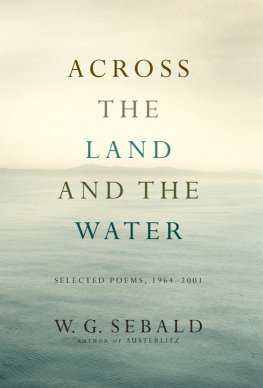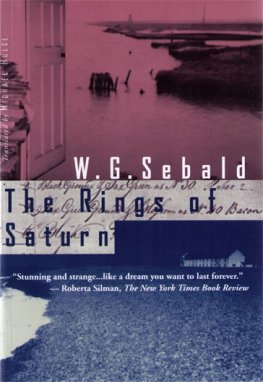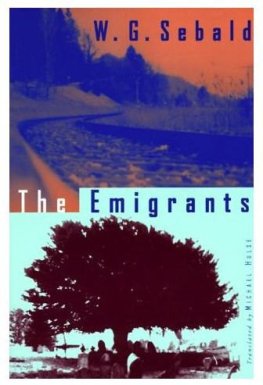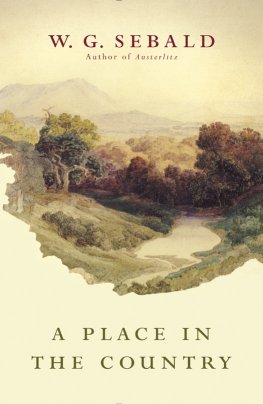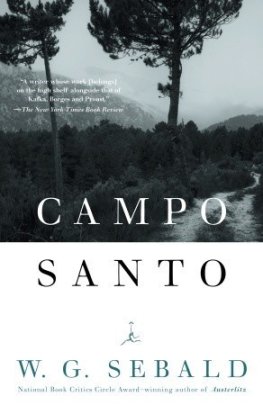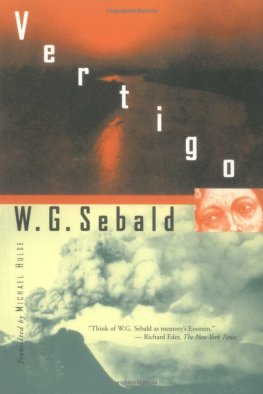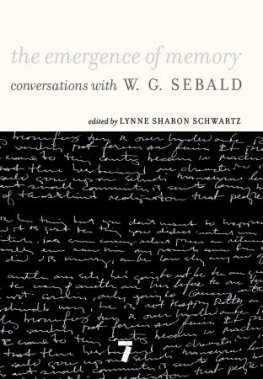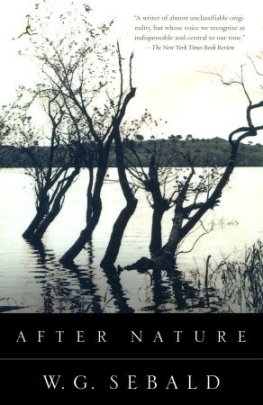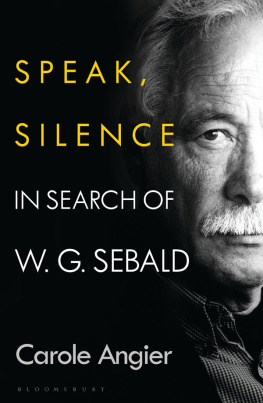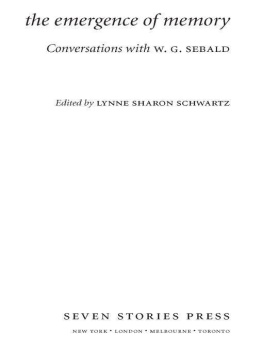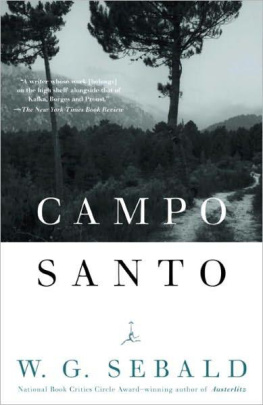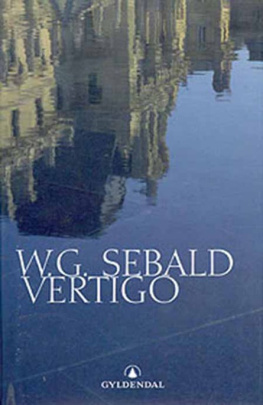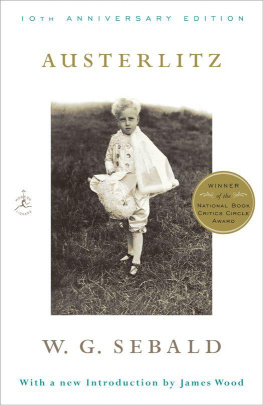W. G. Sebald
Across the Land and the Water: Selected Poems, 1964-2001
My medium is prose, W. G. Sebald once declared in an interview, a statement that is easily misconstrued if a subtle distinction the German author added is overlooked: not the novel. Far from disavowing his attraction to poetic forms, Sebalds sworn allegiance to what he called prose deliberately placed his work at arms length from the generic exactions (plot, character development, dialogue) levied by the more conventional modes of writing fiction. Indeed, it is perhaps only in reading Sebalds poetry whose breathing and tone, especially in the later poems, frequently recall the timbre of the narrative voices in Vertigo, The Emigrants, and The Rings of Saturnthat we may begin to sense the poetic consistency of his literary prose itself, and also that of his writing as a whole. Reversing the focus, readers of Sebalds prose fiction who are coming to his shorter poetry for the first time may be surprised to find that many of the concerns of his acclaimed later prose works are prefigured in his earliest, most lyrical poems: borders, journeys, archives, landscapes, reading, time, memory, myth, legend, and the median state (Edward Said) of the exile, who is neither fully integrated into the new system nor fully free of the old. Following the development of the poetry from its lyrical beginnings to the later narrative forms, we can trace the trajectory of the authors gradual reach for the epic scope of his work in the 1990s, a quest that, I argue, initially culminated in the tripartite, book-length, narrative poem Nach der Natur (After Nature, 1988). On the way, we will discover poems to value for their singular artistic achievements: some puzzling, some dazzlingly hermetic, others deceptively slight or simple, several witty or ironic, each in its different way an encounter with lifes unresolved questions and mysteries, each gazing into the abyss of twentieth-century European history.
W. G. Sebald began publishing poetry as a student in the 1960s, and he continued to write poems throughout his life, publishing many in German and Austrian literary magazines. Among the work he had prepared for publication shortly before his untimely death in 2001 were the volumes For Years Now and Unerzhlt (Unrecounted), while a host of shorter poems that he had intended to publish in the 1970s and 1980s did not come to light until after their posthumous removal to the German Literature Archive in Marbach. Before completing his first major literary work, Nach der Natur, in the mid-1980s, Sebald had prepared and paginated, apparently for publication, two collections of shorter poemsSchullatein (School Latin), and ber das Land und das Wasser (Across the Land and the Water), consisting altogether of some ninety poems neither of which would find its way into print. Leaving aside work that has already appeared in English in the volumes After Nature, Unrecounted, and For Years Now, the present selection of Sebalds poetry offers a representative viewing of work from the two unpublished volumes, while at the same time collecting almost all the shorter poems published in books and journals during his lifetime, including, in an appendix, two poems written by the author in English and published, in 2000, in the Norwich-based literary journal Pretext. Readers may be curious to compare Sebalds own English poems with those which have found their way into English through translation, setting the authors writing in a foreign tongue against foreign translations from his mother tongue.
The present volume presents Sebalds poetic production from the poems and publications of his student years (Poemtrees), across the two unpublished volumes already mentioned, and through the narrative forms of the 1990s and the turn of the millennium (gathered in the section The Year Before Last). Of the eighty-eight poems published here in translation for the first time, thirty-three draw on unpublished manuscripts deposited for the Estate of W. G. Sebald at the German Literature Archive, while fifty-five are translations of poems in the German volume ber das Land und das Wasser (Across the Land and the Water), edited by Sven Meyer in 2008. The question that naturally arises is why Sebald did not publish School Latin or Across the Land and the Water after their completion probably in 1975 and 1984 respectively. There may be no single answer to this question, but one explanation points to what could be called an epic or narrative turn in Sebalds writing during the mid-1980s. In order to understand how this came about, it is necessary to briefly describe the sequence and composition of some of the manuscripts deposited in the writers archive in Marbach.
Sebalds papers, as we shall see, reveal the movement of his poetic work since the mid-1960s as a kind of rolling project or cascade, culminating in the publication of Nach der Natur (After Nature) in 1988. Significantly, however, the three sections of this volume were completed somewhat earlier, with the middle section completed by 1984. It is likely that this and the next year were decisive, marking both the moment of Sebalds turn to longer narrative forms and, simultaneously, the provisional curtailment of his plan to publish a volume of shorter poems. The three sections of Nach der Natur first appeared in the Austrian journal Manuskripte: And If I Remained by the Outermost Sea (October 1984); As the Snow on the Alps (June 1986); and Dark Night Sallies Forth (March 1987). Michael Hamburgers English translation After Nature, whose three sections I have cited here, was published in 2002.
What the papers in the Marbach archive show us is that Sebalds typescript volume School Latin inherited poems from an even earlier, albeit more fragmentary, file: Poemtrees, more a loose bundle of poems than a collection. Twelve poems from this earliest grouping, which are included in the present volume as the first twelve translations in the section Poemtrees, represent Sebalds earliest publications, appearing in a Freiburg students magazine (196465). The collection School Latin supplied seventeen poems, many of them in revised versions to the subsequent collection Across the Land and the Water. Similarly, the final section of this volume, consisting of the full text of And If I Remained by the Outermost Sea, went on to form the second of the three sections of After Nature. Furthermore, the third and final section of After Nature (Dark Night Sallies Forth) incorporates at least eighteen shorter poems, half of them in their entirety and all of them cut from the typescript of Across the Land and the Water. Whole poems that Sebald pasted verbatim into the final section of After Nature have not been included in the present volume.
In conclusion, Sebalds decision, in 1984, to publish the final section of Across the Land and the Water in Manuskripte, and possibly in the same year to allow Dark Night Sallies Forth to cannibalize the shorter poems of Across the Land and the Water, heralded the beginning of an entirely new poetic project and paved the way for the completed typescript of the tripartite narrative poem Nach der Natur to be sent to various publishers in November of 1985. At the same time, however, the concomitant attenuation of the ber das Land und das Wasser typescript effectively ended any plans the author may have harbored to publish a collection of poems based on the material assembled since Poemtrees. Some readers may agree with W. G. Sebald that prose was the medium to which his hand was best suited. Poems written after the mid-1980s, however, not only make it clear that poetry remained an important medium to Sebald until the end of his life (as volumes such as

